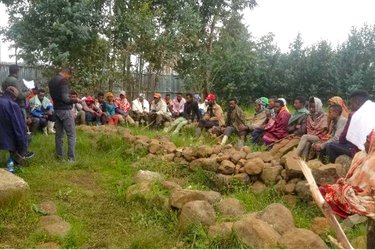
The first LIFE-AR investments for community resilience are starting to bear fruits in Ethiopia.
In Ethiopia’s Kembebit woreda, communities are already reaping the benefits of climate-resilient investments under the LIFE-AR initiative. During the LIFE-AR Test and Evolve phase in 2023, three rural kebeles were targeted and investments selected to address key climate challenges like drought and frost. Both hazards have severely impacted rural livelihoods by reducing crop yields, limiting water access, and lowering household incomes. LIFE-AR’s interventions aim to bring sustainability and resilience to these vulnerable communities.
The LIFE-AR task team selected the Kembebit woreda following several criteria, including climate change vulnerability, security level, location, size, soil degradation and other criteria. In a shift versus usual practice, the investments target only one woreda with a holistic approach to strengthen community resilience in multiple sectors through interconnected investments at woreda level.
This multi-sector initiative also embraces the LIFE-AR “whole-of-society” and “whole-of government” principle, which aims to ensure collaboration between a wide range of actors and to put communities in the driving seat for the selection and prioritisation of investments. Through consultations and conversations with Kebele Community Representative Committees (KCRCs), a total of eight investments were identified, covering potable water supply, dairy and poultry production, with enhanced value chains, natural resource management, off grid solar power supply and the development of biogas. Four key investments were prioritised for implementation: improved water supply, solar energy, dairy production, and poultry farming. The participatory process is also referred to in LIFE-AR as a “whole-of-society” approach, and it not only secured community buy-in but also fostered shared responsibility. LIFE-AR provides the initial funds, the national task force offers trainings and technical advice, and locals provide labour, in-kind contributions, and monetary support to ensure sustainability.

Access to clean and safe water was a top priority for the community. Families or livestock do not have easy access to reliable water sources, forcing long treks to fetch water and increasing waterborne diseases from unsafe sources, a situation that is worsened by recurrent droughts. To tackle this, LIFE-AR is drilling two new deep wells and rehabilitating another in three kebeles. These wells will be equipped with reservoirs and distribution points to ensure clean water access for over 5,000 rural residents, with indirect benefits reaching 7,000 more, including schools and health centres. Once completed, this investment hope to significantly reduce the burden on women and children while improving community health and productivity.
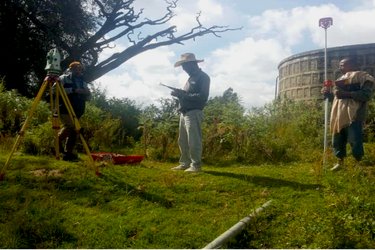
Kembebit residents usually relied on firewood, kerosene and fuel for energy, leading to deforestation, indoor air pollution, and health challenges. Solar energy has emerged as a game-changer, providing clean, affordable, and sustainable electricity to households.
Through LIFE-AR, 54 households in three kebeles will receive solar panel systems. As of March 2025, 43 solar panels were delivered to households g, with the remaining units in the procurement phase. Over the first 3 months, solar panels already provided significant savings for beneficiaries. Solar energy is expected to support over 1,700 individuals, enabling children to study at night, reducing reliance on costly fuel, and protecting natural resources. This transition to renewable energy is a critical step toward building climate resilience and improving quality of life.
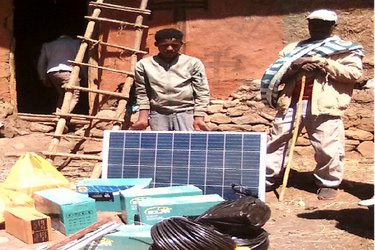
Locally produced milk provides essential nutrition, reduces child mortality, and combats food insecurity. However, the sector faces challenges like poor fodder availability, outdated management practices, and limited veterinary services. Frost in highland areas further reduces cattle productivity. To address these issues, LIFE-AR mobilized 20 households, including youth, women, and low-income families, to participate in dairy production upgrades. Climate-smart sheds were constructed, seven dairy cows were procured and farmers received 10 months of quality cattle feed to establish sustainable practices. By promoting hybrid cattle breeds, milk production is expected to increase, directly benefiting 20 households. This investment is to be complemented by the strengthening of milk value chain in Kembebit. Additionally, cattle dung is repurposed as compost, enhancing soil fertility and promoting sustainable agriculture. This investment strengthens climate resilience by ensuring a stable food supply, creating new income streams, and improving agricultural productivity, even during climate shocks.
Local actors played crucial roles in this initiative. The technical committee focused on selecting land, designing sheds, managing contracts, and providing veterinary services. Meanwhile, the KCRC worked to boost community awareness and ensured that procurement aligned with local needs. Dairy production beneficiaries took charge of providing forage, drafting management by-laws, and maintaining the sheds. This collaborative effort is not only building the resilience of dairy production to climate change but also promoting sustainable growth through community-led governance and capacity-building.
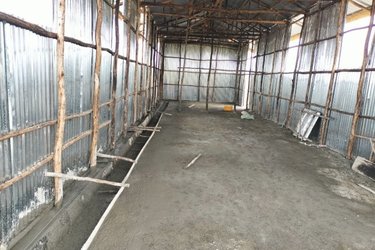
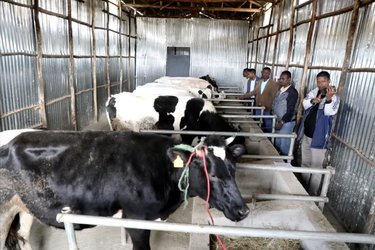
Poultry farming has been identified as a low-cost, high-impact investment for women and disabled producers in Kembebit. Chickens require minimal land, labour, and capital while providing families with nutritious protein and a source of income. They also serve as liquid assets, offering quick financial relief during climate shocks. The initiative organized 120 households into three groups, with women and youth making up 26.7% and 58.3% of members, respectively. Climate-smart poultry shades were built, and 600 out of 1,200 hybrid chickens have been distributed. Farmers received forage for three months to enable them to start building income. This investment is expected to increase community resilience by offering reliable income, improving household nutrition, and creating a sustainable livelihood option for vulnerable groups.
The investment leverages a whole of society ethos, with local actors and community members playing specific incentivized roles. The woreda technical committee assisted with land selection, poultry house design, supplier contract management, and veterinary services. KCRC manages community awareness and chicken procurement. Beneficiaries are responsible for forage provision, drafting poultry shed management bylaws, maintaining facilities, and contributing in-kind labour and finances to ensure sustainability.
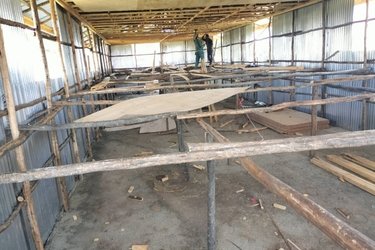
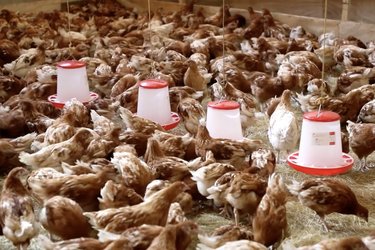
The impact of these four first investments are expected to extend far beyond the individual projects. The initiative connects various projects, including the enhancement of the poultry and dairy value chain, biogas, and natural resource management. The first four activities will create ripple effect of resilience, sustainability, and improved livelihoods across Kembebit:
By addressing both immediate needs and long-term challenges, the combination of all eight investments aim to increase health, resilience, and sustainability in the face of climate change for the communities in Kembebit woreda. They demonstrate the power of locally driven, climate-smart solutions to transform lives and secure a sustainable future. LIFE-AR’s work in Kembebit is not just about surviving climate shocks—it’s about thriving despite them.